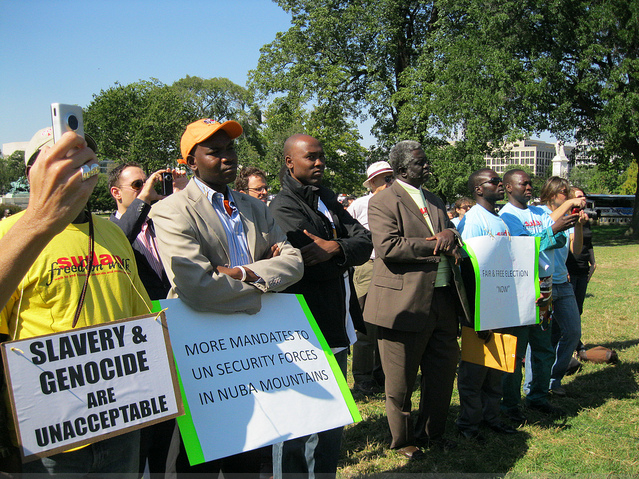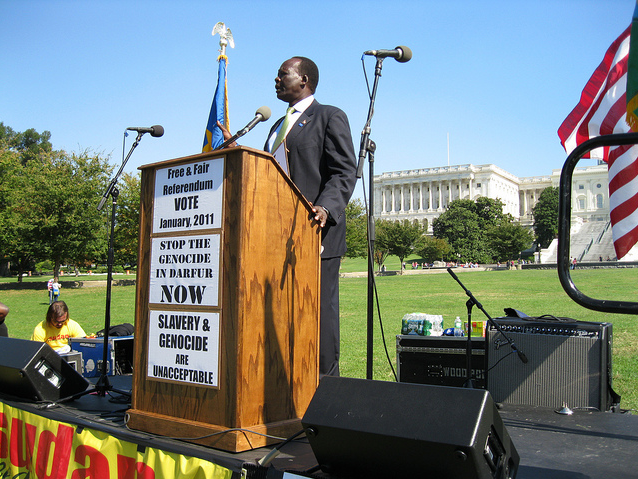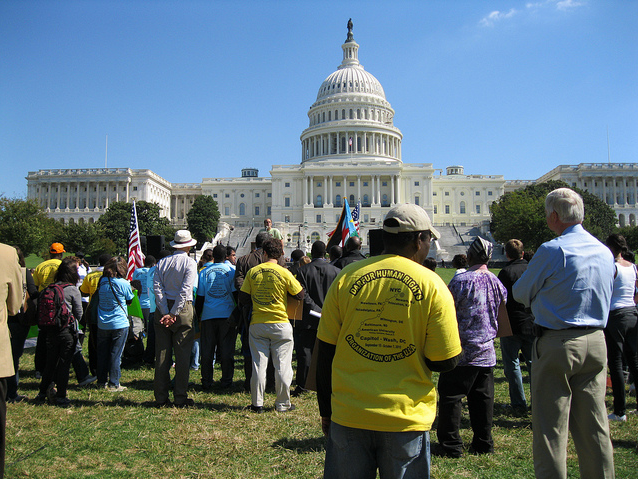The Original Darfur

Escaped slave and human rights champion Simon Deng arrived in Washington D.C. today, leading a group of several dozen determined activists who walked with him 300 miles from the United Nations in New York to the Capitol building to raise awareness about a planned January 11, 2011 referendum to grant independence to South Sudan.
Deng, a former child slave who became a national swimming champion in Sudan, is also a champion of human rights, including the rights of his people, the South Sudanese, mostly Christians and animists–or practitioners of native religions–who he says have been slaughtered and persecuted in huge numbers since the 1950’s. While he was enslaved by an Arab Muslim family against the backdrop of what he terms “genocide against Christians” by a radical Muslim government, race and religion are not markers of decency for him; in the past, he has marched to raise awareness about the slaughter of Darfuri Muslims.

He emphasizes, however, that the mostly Christian South Sudanese were the original victims of Sudan’s radical Islamist government – the same government that sheltered Osama bin Laden in the 1990’s and that continues to perpetrate the Darfur genocide.
“Three and a half million South Sudanese were slaughtered by Khartoum,” he told a multi-racial, multi-ethnic crowd this afternoon that included students, activists, and professionals who had taken time off work to attend. With tears streaming down his cheeks he added, “This is their walk, not my walk.”

Deng told the crowd that President Obama must ensure the January 11, 2011 referendum, in which southern Sudanese will be given a chance to vote for their independence, must not be delayed, and that any slaughter or violence will not be tolerated.
The referendum is a condition of a 2005 Comprehensive Peace Agreement drafted by the Bush Administration granting South Sudan the right to vote for its autonomy.

Also speaking at the rally was Charles Jacobs, co-founder of the American Anti-slavery Group, an organization dedicated to abolishing slavery, which still exists in Sudan. Jacobs emphasized that President Obama must hold Khartoum accountable.
“President Obama, you have to make sure the referendum is not delayed,” said Jacobs. “Make clear to Bashir – there will be consequences if he instigates another genocide.”

Jacobs also sought to provide some historical context, and accused the human rights community of employing a double standard in paying selective attention to some abuses more than others.
“Sudan is the scene of two mass murders, one in Darfur, the other in South Sudan, which is currently on hold,” said Jacobs. “The reason we don’t act in Darfur is the victims are black and Muslim. The reason we don’t act is the perpetrators are Arab and Muslim. You’re not supposed to say it, but it’s true.”
He called on Americans to press President Obama to prevent slaughter of human beings in Sudan and to lobby for greater international oversight than is currently planned to ensure the 2011 referendum can proceed without violence.
“We forced President Bush to change U.S. foreign policy [regarding Sudan],” said Jacobs. “Now it’s time to raise the awareness of President Obama. We are approaching January 9 [2011]. It is a historic day President Obama. Put it on your calendar. It is a day a nation will find its freedom.”
Another speaker at the event was Emmanuel Jal. Born in South Sudan, Jal gave an eyewitness account of having seen his aunt raped and his mother beaten by soldiers of the Khartoum government, of becoming a child soldier, and eventually becoming one of the “lost boys” – or South Sudanese children who tried to flee the genocide on foot.
He spoke about his fellow “lost boys,” recalling their days of starvation and despair, remembering moments of solidarity and humanity they shared, and mourning their deaths.
“I have been on a hunger strike for 90 days, eating one meal a day, for the Lost Boys of Sudan,” including his friends who died, he explained.
He spoke of the rage he felt seeing his family and friends brutalized and killed, his years as a child soldier, during which no amount of “killing the enemy” could bring back his loved ones. He is now in a place in his life where he wants to “raise people’s EQ or emotional intelligence quotient” about coexistence.
He wants his fellow Africans, including Darfuri Muslims, to know that the quest for independence in South Sudan does not exclude them, because he knows that they are also victims of Khartoum’s extremist Muslim government.
“Darfuris used to fight us but now they came to their senses,” he said. “They know they were tricked, so we’re going to work together, and we’ll get our freedom.”
A musician, Jal performed a moving song dedicated to Emma McHugh, the woman, who has since died, who he says rescued over 150 child soldiers in Sudan, including him. The refrain was, “What would I be/If Emma never rescued me?”
He shared his hopes for an independent South Sudan.
“Where I come from, sure we have freedom of speech. But there’s no freedom after you speak [if you say something the Khartoum government doesn’t like]. I want to live in a country where I can be free. I want to live in a country where I can worship God as I want, not the God another person forces on me.”
What he loves about America, he says, is that even leaders must understand and honor the concept of freedom of speech.
“People drew cartoons about George Bush – he didn’t care,” said Jal.
Following the song he told the crowd, “One day in Sudan we will sing the same song, ‘Where would we be if Americans never stood with us?'”
This entry was written by Heather Robinson and posted on October 7, 2010 at 6:31 pm and filed under Blog. permalink. Follow any comments here with the RSS feed for this post. Keywords: Africa, human-rights, Sudan, terrorism. Post a comment or leave a trackback: Trackback URL. */?>



